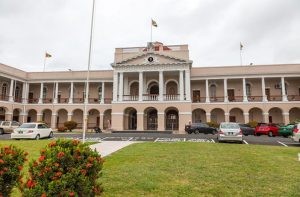
I recently came across a letter published under the heading ‘Only two survivors now from final Independence Conference’ (SN January 20, 2021).
Of interest to me are three issues referred to in the letter. All three issues are of historical significance.
First about Llewellyn John.
Apart from his participation in the talks in the 1960’s for an independent British Guiana, eighteen years later, on the home front, John’s party, the People’s Democratic Movement (PDM) became actively involved in the Committee for Defence of Democracy (CDD) and later, the Patriotic Coalition for Democracy (PCD). The CDD led a successful boycott of the 1978 referendum. And the PCD, from 1985 to 1990 led the struggle for free and fair elections in Guyana.
Cheddi Jagan of the People’s Progressive Party (PPP), Eusi Kwayana of the Working People’s Alliance (WPA), Paul Tennassee of the Democratic Labour Movement (DLM), and Joseph Bacchus of the National Democratic Front (NDF) along with Llewellyn John’s PDM were the leaders who pushed collectively for the restoration of democracy in Guyana.
Therein lies John’s historic contribution to the struggle for free and fair elections in Guyana.
I emphasize these historical facts because there are some in our country who perhaps, through no fault of theirs, are of the mistaken belief that the struggle for free and fair elections began with the political shenanigans by the APNU+AFC in 2018, culminating in the victory of the PPP/C in August 2020. Truth be told, that struggle began way back in the 1960’s. Parliament today stands as a beacon of light after many years of dark days and nights of struggle by those who lit the flame a long time ago.
The second observation is about Lancaster House and the writer’s reference to ‘our inability to connect past events to the present….’
In supporting this view, I wish to allude to two events, during which I had the opportunity to savour a sense of history and to link the past to the present. The opportunity was occasioned as I sat in the ‘Long Gallery’ of Lancaster House where epoch-making meetings took place once upon a time.
Lancaster House was the venue for independence talks for many former colonies of Britain including Ghana, Nigeria, Kenya, Zambia, Cyprus, Malaysia and Guyana among others.
It was in that same Long Gallery, at the same Lancaster House, more than four decades ago following those historic negotiations, I had the opportunity to participate, in the second meeting of the Caribbean-UK Forum held in May 1999 in London and a few years later, in 2014 in a meeting of Commonwealth countries to formulate a framework for a cyber security strategy for a group of Commonwealth countries.
As I explored the many galleries and huge paintings that adorned the walls in Lancaster House, I could not help but to conjure up images of the historic events that took place in the hallowed chambers of that building.
Under those circumstances, it was not so difficult to make the connection between the past and the present knowing that Lancaster House embodies the history many of nations and the personalities who eventually led those nations to independence.
This brings me to my third observation.
In the final paragraph of the Research Assistant’s letter it states: “Of interest and historical note is that in spite of efforts at home and abroad the PPP failed to attend this final conference on independence.”
It is regrettable that the Research Assistant stopped at half of the truth. Which begs the question; what was it that motivated the Research Assistant not to delve further with a view to providing the wider Guyanese society with the whole truth and nothing but the truth.
It is to be assumed that the Research Assistant was not bound by any political impediment and was free to pursue scholarly research of a qualitative nature on the subject matter.
To assist the Research Assistant, I respectfully suggest that reference be made to Chapter XVI ‘Labour and Independence’ in Cheddi Jagan’s ‘West on Trial’ with a view to finding Dr. Jagan’s explanation as to why the PPP ‘failed’ to attend the final conference on the independence of British Guiana.
In the circumstances, it is far better to break intellectual sweat to produce quality work rather than gain dishonour through weak and half truthful research.
Yours faithfully,
Clement J. Rohee